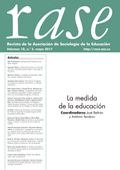Institutional functions as a theoretical nexus and measurement target in the sociology of education
DOI:
https://doi.org/10.7203/RASE.10.2.10115Keywords:
Education, institutional functions, criteria of definition, sociology Abstract
Abstract
The paper is devoted to methodological aspects of the study of institutional functions of education as one of the basic theoretical constructs of contemporary sociology of education. The author argues that the elaboration into the function problem also provides a direction for social-practical outputs of this branch of sociology, conceptual ground for its own theoretical, revitalizing its connection with general sociology. Without such elaboration, the author assumes, most of theoretical and empirical studies and measurements conducted by sociologists are doomed to thematic fragmentation, have slim chances to contribute to a shared sociological vision of education, delineate the area of institutional responsibility of education in society, improve educational politics, resist the neoliberal “Trojan horses” in education. The author brings a set of criteria to define the institutional functions of education, including the empirical measurability of each function, and a hypothetical model of functions detailed by four major areas of society: economic, social, cultural and political.
 Downloads
Downloads
Published
How to Cite
-
Abstract544
-
PDF (Español)650
-
PDF80
-
PDF (Català)98
Issue
Section
License
![]()
This work is licensed under a Creative Commons Reconocimiento-NoComercial-CompartirIgual 4.0 Internacional.




